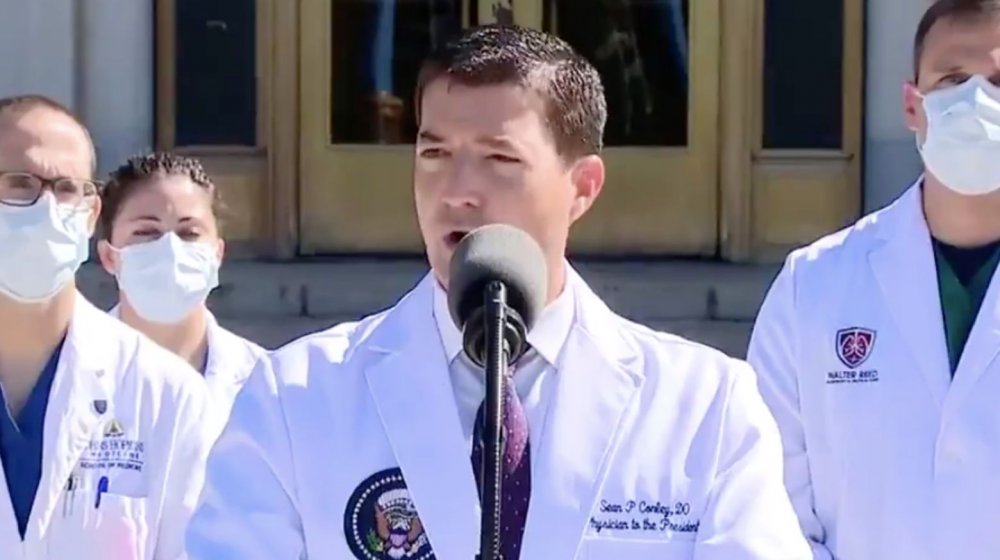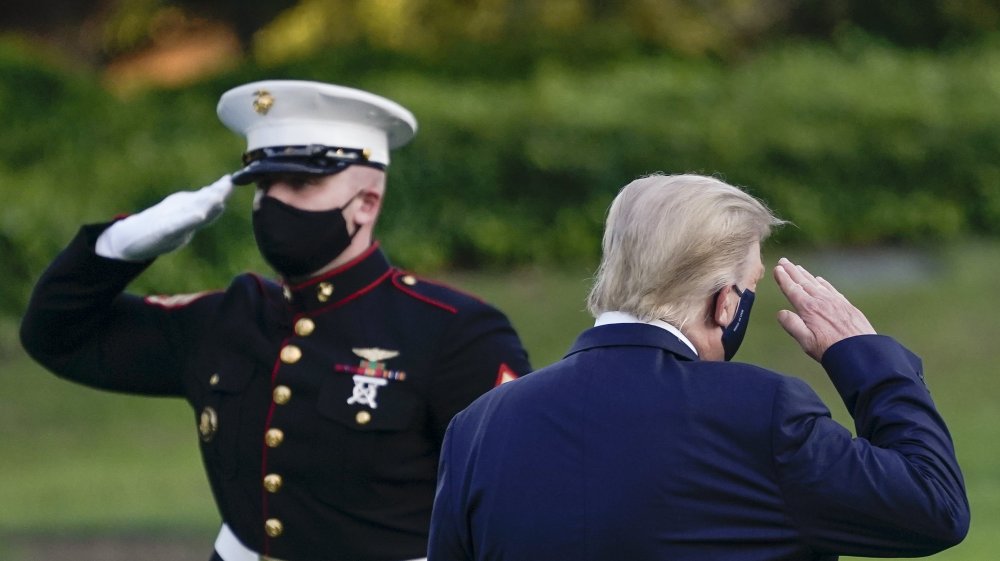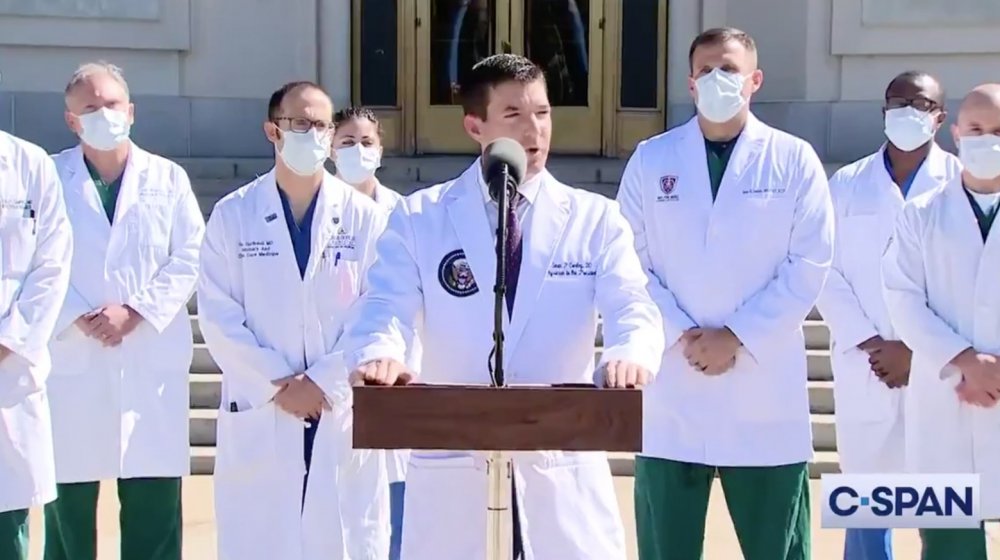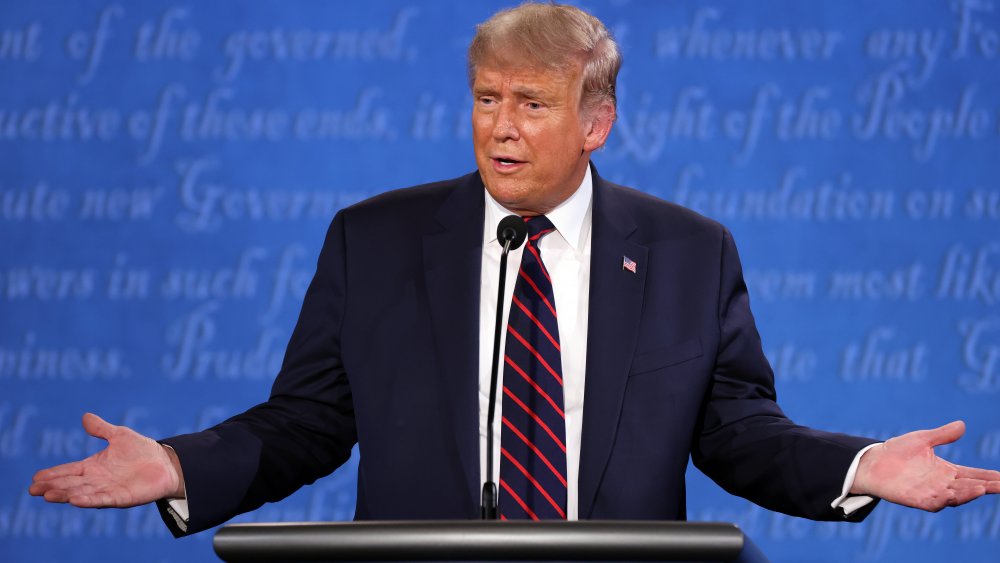The Untold Truth Of Dr. Sean Conley
The untold story of Dr. Sean Conley might be a little shady. During an Oct. 3, 2020 briefing on President Donald Trump's battle with COVID-19, Dr. Conely gave an upbeat account of the commander-in-chief's health status: "This morning, the president is doing very well... At this time the team and I are extremely happy with the progress the president has made." The White House physician announced Trump was "just 73 hours into the diagnosis," which actually differed from the White House's timeline of events, according to USA Today.
Shortly after the aforementioned health briefing at Walter Reed Military Medical Center, Dr. Conley walked back his statement on the timing of Trump's illness. CSPAN published Conley's correction statement on Twitter, which read, "This morning while summarizing the President's health, I incorrectly used the term 'seventy two hours' instead of 'day three' and 'forty eight hours' instead of 'day two' with regards to his diagnosis and the administration of the polyclonal antibody therapy."
Adding additional drama to Dr. Conely's health update came after the AP and New York Times reported a very different picture of the president's situation. Shortly after the briefing at Walter Reed, White House Chief of Staff Mark Meadows spilled a differing view of President Trump's health. In other words, Meadows contradicted Conley's happy health news.
Read more to learn more about Dr. Sean Conley and his connection to the president.
Dr. Sean Conley is President Trump's doctor
Dr. Sean Conley serves as the official physician to the president. He is the primary doctor for President Donald Trump and Vice President Mike Pence. Dr. Conley is a doctor of osteopathic medicine, not an MD. USA Today cited UCLA's Geffen School of Medicine and reported that doctors of osteopathic, or DOs, "prioritize osteopathic, holistic approaches to treatment, as opposed to more 'traditional' MDs."
In 2018, Conley was selected to be the White House physician after Dr. Ronny Jackson left the position. That same year, Dr. Jackson told Americans Trump's weight and expressed concern over it, but also raved about the president's "excellent" health and genes: "It is called genetics... Some people have just great genes. I told the President that if he had a healthier diet over the last 20 years, he might live to be 200 years old."
While Dr. Conley hasn't gone as far as his predecessor to cover up Trump's arguably unhealthy habits (french fries help hair?), the precedent set by Dr. Jackson is a bit troubling.
Dr. Sean Conley has an extensive résumé
According to Dr. Sean Conley's LinkedIn, he has extensive medical experience with the U.S. military. After graduating with a Bachelor's of Science from Notre Dame University in 2002, he spent four years obtaining his Doctor of Medicine from the Philadelphia College of Osteopathic Medicine, which he received in 2006. Conley immediately started a three-year residency at the Naval Medical Center in Portsmouth, Va. Upon completion, he was sent to a North Atlantic Treaty Organization (NATO) hospital in Afghanistan for seven months. Conley spent the next six years working different positions at the Naval Medical Center. His LinkedIn says he still serves as an emergency physician for the U.S. Navy.
NBC News reported that Conley was hand-picked by his predecessor, Dr. Ronny Jackson, and is the first doctor of osteopathic medicine to serve the White House, a position that has existed for more than 100 years (per The New York Times). However, NBC sources also reported that Conley is "viewed by many within the White House Medical Unit as having been unfairly promoted to the job of physician to the president without proper vetting." While there may be bitterness for the White House physician among his cohorts, he has also stirred up some controversy in the public eye.
Dr. Sean Conley supported President Trump's use of hydroxychloroquine
Although Dr. Sean Conley is a doctor of osteopathic medicine, Conley and President Donald Trump quickly decided that Trump should take hydroxychloroquine, the antimalarial drug, to help prevent COVID-19. Despite warnings of potential serious heart risks from the Food and Drug Administration (FDA), Conley wrote a letter explaining that he and Trump "concluded the potential benefit from treatment outweighed the relative risks." In April 2020, the FDA said the drug should be used only in clinical trials or in hospitals. Conley's announcement drew many concerned responses from health experts, as reported by The New York Times. In the Oct. 3 press conference covering Trump's coronavirus status, Conley stated that Trump was not taking hydroxychloroquine.
However, this wasn't the only controversial statement Trump and his team have made about preventive COVID-19 measures. During a coronavirus briefing in April 2020, Trump mentioned an official presentation that said some disinfectants could kill the virus on surfaces and in the air, and then suggested that disinfectants might work in the human body. "I see the disinfectant that knocks it out in a minute, one minute," he noted (per The Washington Post). "And is there a way we can do something like that by injection inside, or almost a cleaning?" He received a load of backlash, and later said his remarks were "sarcastic." Conley did not publicly comment.




